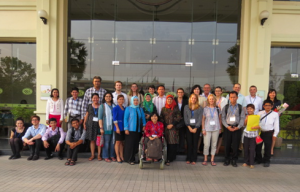 18 May 2015
18 May 2015
Phnom Penh, 21 March 2015. “Economic progress in the region in many cases lacks an enabling environment fostering the inclusion of persons with disabilities”, Mr Adelbert Eberhardt, Country Director of GIZ Cambodia opened the workshop titled ‘Bridging the gap between policy and practice – cross-sectoral innovations on economic inclusion of persons with disabilities’.
More than 30 experts from seven Asian countries came together in Phnom Penh from March 18-20 to discuss experiences and innovative approaches towards economic inclusion. For the first time, GIZ invited colleagues, partners and international experts to discuss the topic from a cross-sectoral perspective and to identify areas for intersectoral cooperation in the region.
“Collaborative partnerships are a key driver for a change process towards inclusion”, His Excellency Mr Em Cham Makara, Secretary General of the Disability Action Council in Cambodia, pointed out in his opening speech. This was taken up by Mr Patrik Andersson, Chief of the Social Integration Section at UNESCAP, who set the regional and thematic frame of the workshop. Health, social protection, vocational training and employment are essential sectors for strengthening the economic inclusion of persons with disabilities. Yet, access to these sectors and specific services remains limited due to prevailing stigma and discrimination. Participants shared the view that it is the exclusion of persons with disabilities which causes substantial costs for economies and leaves economic and social potential unused.
Based on the BMZ Action Plan on the Inclusion of Persons with Disabilities, Ingar Duering, Head of the GIZ Sector Initiative “Inclusion of Persons with Disabilities”, provided the participants with an overview of the current approach and related activities of German Development Cooperation. She emphasised that inclusion is a process that requires perseverance and joint efforts to guarantee sustainability.
Mr Hay Hunleng, representative of the National Employment Agency in Cambodia outlined current efforts in designing and offering matching services. Amongst others, a new job data base and support in recruitment processes aim to improve labour market access for persons with disabilities.
Following intensive and fruitful debates in sectoral working groups, participants discussed cross-sectoral approaches and future directions for the economic inclusion of persons with disabilities in a market place.
At the end of the workshop, lively exchange among experts from different sectors has created a first platform for the promotion of comprehensive inclusive approaches in GIZ’s partner countries. In order to enable further discussion and joint learning, similar exchange formats will be taken up in virtual technical forums in the future.

